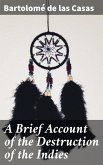In "A Brief Account of the Destruction of the Indies," Bartolomé de las Casas delivers a poignant and vehement denunciation of the atrocities committed against the indigenous peoples of the Americas by Spanish colonizers during the early 16th century. Written in a straightforward yet impassioned literary style, this foundational text in post-colonial literature not only documents the harrowing experiences of natives subjected to violence, enslavement, and cultural eradication, but it also critiques the moral bankruptcy of colonial enterprises. Las Casas employs vivid imagery and emotional appeals, aimed at evoking a sense of moral urgency, as he seeks to raise awareness among European audiences about the dire consequences of imperialism. As a former conquistador turned Dominican friar, Bartolomé de las Casas witnessed firsthand the brutal treatment of Indigenous populations, which catalyzed his transformation into a passionate advocate for their rights and welfare. His unique position in colonial society, coupled with his deepening commitment to evangelical Christianity, informed his subsequent writings, framing him as one of the earliest defenders of human rights in the New World. Las Casas's experiences and convictions compelled him to serve as a fierce critic of Spanish colonial policy, making his insights particularly valuable in understanding the moral complexities surrounding colonialism. This essential read is highly recommended for scholars, historians, and any reader interested in the ethical implications of colonialism. Las Casas's powerful account not only serves as historical documentation but also incites vital discussions about justice, morality, and the consequences of imperial expansion. In engaging with this text, readers will gain a profound understanding of the early colonial period and its lasting impacts on Indigenous populations.
Dieser Download kann aus rechtlichen Gründen nur mit Rechnungsadresse in A, B, BG, CY, CZ, D, DK, EW, E, FIN, F, GR, H, IRL, I, LT, L, LR, M, NL, PL, P, R, S, SLO, SK ausgeliefert werden.









